新首相梅姨要收拾多少烂摊子?
特蕾莎·梅:英国第二位女首相
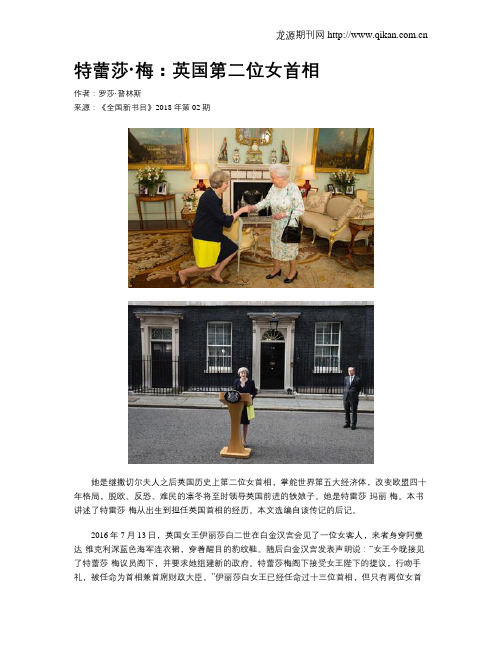
特蕾莎·梅:英国第二位女首相作者:罗莎·普林斯来源:《全国新书目》2018年第02期她是继撒切尔夫人之后英国历史上第二位女首相,掌舵世界第五大经济体,改变欧盟四十年格局,脱欧、反恐、难民的凛冬将至时领导英国前进的铁娘子。
她是特雷莎·玛丽·梅。
本书讲述了特雷莎·梅从出生到担任英国首相的经历。
本文选编自该传记的后记。
2016年7月13日,英国女王伊丽莎白二世在白金汉宫会见了一位女客人,来者身穿阿曼达·维克利深蓝色海军连衣裙,穿着醒目的豹纹鞋。
随后白金汉宫发表声明说:“女王今晚接见了特蕾莎·梅议员阁下,并要求她组建新的政府。
特蕾莎梅阁下接受女王陛下的提议,行吻手礼,被任命为首相兼首席财政大臣。
”伊丽莎白女王已经任命过十三位首相,但只有两位女首相,在这一刻,不知道她有没有想起将近四十年前的一幕:53岁的女王任命54岁的撒切尔夫人为英国历史上第一位女首相。
如今90岁的女王又任命了60岁的特蕾莎梅,后者成为撒切尔夫人之后英国第二位女首相。
现代议会政治发源于英国,对现代世界产生了巨大影响,所以有“英格兰是议会之母”的说法。
目前活跃于英国政坛的保守党,可以追溯到18世纪英国议会中的托利党,被视为世界最古老的有组织政治团体之一。
凡历史悠久的制度、组织、团体,往往循传统而趋保守。
当代保守党的政治观点虽然渐趋多样和灵活,但从整体来说,保守主义依然是其主流意识形态。
恰恰是在这个奉行保守主义的政党之中,先后出现了英国历史上仅有的两位女首相:撒切尔夫人和特蕾莎·梅。
撒切尔夫人更是西方发达国家中第一位女性领导人,其影响恐怕只有2005年当选的德国首任女总理默克尔可以与之相提并论。
传统被打破,旧规被破除,往往发生在危机和变革来临之时。
1978年底至1979年初,英国发生了一系列罢工运动,被称为“不满的冬天”,工党政府应对失措,在1979年大选中被撒切尔夫人领导的保守党赶下台。
三梅伦新政面临三重经济挑战
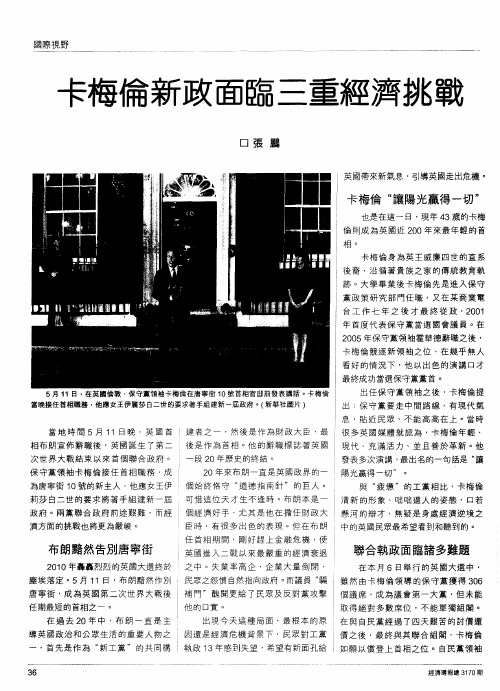
出任 保 守 薰 领 袖之 後 t 梅 偷提 卡
出 : 守 熏 要 走 中 同路 综 , 保 有现 代 氟 息 , 近 民 - 能 高 高在 上 。凿畴 贴 不
耆 地 畴 同 5月 1 l ,英 圈 首 建 者 之 一 , E晚 1 然後 是 作 财 政大 臣 , 最 很 多英 圜媒 醴 就 韶 , 梅 偷 年 轻 、 卡
任期最 短的 首相 之一 。 他 的 口宣 。 取 得 封 多敷 席 位 , 能 罩 猾组 蔺 。 不 在遇 去 2 O年 中 , 朗 一 直 是 主 ; 布 出现 今 天 逭 槿 局面 , 根 本 的 原 在 舆 自民 熏 经 遇 了 四天 欺 苦 的封 债遗 最
英 固政 治 和 公 生 活 的重 要人 物 之 因 遗是 短 漕 危檄 背景 下 , 民 封 工 熏 债 之後 - 终舆 其 合组 冈 ・ 梅 偷 最 卡
相 布 朗 宣怖 醉 皲 後 , 圜瓤 生 了第 二 後 是作 首 相 。 的 醉皲 檩 著 英 圜 英 他 现 代 、 满活 力 、 且善 於 革 新 。 充 韭 他
次世 界 大戟 结 束 以 束 首佃 合 政 府 。 ~段 2 0年雁史 的终结 。
餮表 多次演满 ・ 最出名 的一句 螽是 “ 禳 光赢得 一切 ” 。
自民 薰 内闰成 虽的政 府 。
舆此 同畴 , 守 熏 和 自 保
民 薰 在 圜防 、 民 、欧 盟 等 移
精 , 减 赤 字 将 成 卡 削 梅 偷任 期 的最 大挑 戟 。 檩
普两 日前 表示 ・ 固赤 字估 英 GDP比例 将在 2 1 0 0年建 到
5月 1 l, 3 E 新任 外交大臣黑格 、 德检察 畏格里 夫 、大法官及司法大 臣克拉 克舆就檠 及蓑老金事 稿大 臣史密斯 ( 链左至 右 )抵建 首相官邸唐
陈红旭:英退欧后换帅,难挽油市颓势!
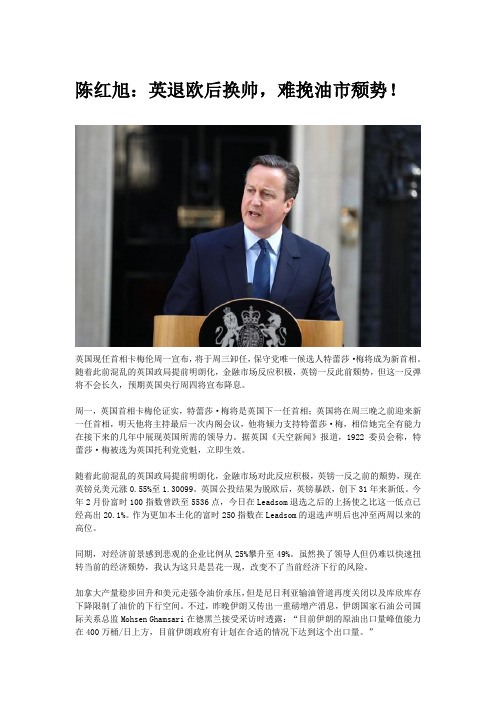
陈红旭:英退欧后换帅,难挽油市颓势!英国现任首相卡梅伦周一宣布,将于周三卸任,保守党唯一候选人特蕾莎·梅将成为新首相。
随着此前混乱的英国政局提前明朗化,金融市场反应积极,英镑一反此前颓势,但这一反弹将不会长久,预期英国央行周四将宣布降息。
周一,英国首相卡梅伦证实,特蕾莎·梅将是英国下一任首相;英国将在周三晚之前迎来新一任首相,明天他将主持最后一次内阁会议,他将倾力支持特蕾莎·梅,相信她完全有能力在接下来的几年中展现英国所需的领导力。
据英国《天空新闻》报道,1922委员会称,特蕾莎·梅被选为英国托利党党魁,立即生效。
随着此前混乱的英国政局提前明朗化,金融市场对此反应积极,英镑一反之前的颓势,现在英镑兑美元涨0.55%至1.30099。
英国公投结果为脱欧后,英镑暴跌,创下31年来新低。
今年2月份富时100指数曾跌至5536点,今日在Leadsom退选之后的上扬使之比这一低点已经高出20.1%。
作为更加本土化的富时250指数在Leadsom的退选声明后也冲至两周以来的高位。
同期,对经济前景感到悲观的企业比例从25%攀升至49%。
虽然换了领导人但仍难以快速扭转当前的经济颓势,我认为这只是昙花一现,改变不了当前经济下行的风险。
加拿大产量稳步回升和美元走强令油价承压,但是尼日利亚输油管道再度关闭以及库欣库存下降限制了油价的下行空间。
不过,昨晚伊朗又传出一重磅增产消息,伊朗国家石油公司国际关系总监Mohsen Ghamsari在德黑兰接受采访时透露:“目前伊朗的原油出口量峰值能力在400万桶/日上方,目前伊朗政府有计划在合适的情况下达到这个出口量。
”真正对原油价格起到作用的是产油国的原油出口量,伊朗在解除制裁后3个月时间就实现出口量200万桶/日。
而场内有许多未经证实的分析显示:这个出口增加主要的来源是伊朗国内的产量,而非来自于伊朗的原油库存。
那么如果加上伊朗的库存,维持短期400万桶/日的出口还是有可能的。
马哈迪穆罕默德马来西亚第四任首相与改革者

马哈迪穆罕默德马来西亚第四任首相与改革者马哈迪·穆罕默德(Mahathir Mohamad)是马来西亚历史上的重要人物之一,他作为第四任马来西亚首相,对马来西亚进行了广泛的改革,并产生了深远的影响。
本文将从马哈迪·穆罕默德的背景、他的改革理念以及他在马来西亚的改革实践等方面进行探讨。
一、背景介绍马哈迪·穆罕默德于1925年出生在马来亚的一座小村庄。
他在新加坡和英国接受了良好的教育,后来成为一名医生。
然而,他对政治和国家发展的关注逐渐超过了医学事业。
他被视为一个改革者和先驱者,他深知马来西亚的发展潜力,并致力于推动国家的现代化。
二、改革理念作为一个改革者,马哈迪·穆罕默德坚信,为了让国家发展起来,必须进行广泛的改革。
他提出了许多改革理念,包括经济独立、科技创新、国民团结等。
他认为,马来西亚必须摆脱对外国的过度依赖,才能真正实现自主发展。
因此,他推动了一系列的经济政策,以促进本土产业的发展,并吸引外国投资。
三、经济改革马哈迪·穆罕默德对马来西亚的经济进行了深刻的改革。
他实施了一项名为“马哈迪计划”的经济蓝图,旨在促进产业升级和技术创新。
通过鼓励本土企业的发展,他成功地推动了马来西亚的工业化进程,将该国由农业国家转变为工业化国家。
这一系列的改革措施为马来西亚带来了巨大的经济增长和社会发展。
四、教育改革教育是国家繁荣和社会进步的重要推动力量。
马哈迪·穆罕默德意识到教育体系的重要性,并进行了大胆的教育改革。
他重视科技教育的发展,并推动科技教育的普及化。
他还推动了母语教育的发展,使马来西亚的各个民族能够保留自己的文化和语言,并促进了国家的团结与多元化。
五、政治改革在政治方面,马哈迪·穆罕默德提出了“马来西亚模式”的理念,旨在建立一个和谐共存的多族国家。
他主张所有马来西亚公民平等地享有权利和机会,不论种族或宗教。
他还通过推行改革,强调反腐倡廉,加强政府的透明度和有效性,为马来西亚的民主制度奠定了基础。
特蕾莎·梅就职演讲:脱欧系重大变革将迎难而上
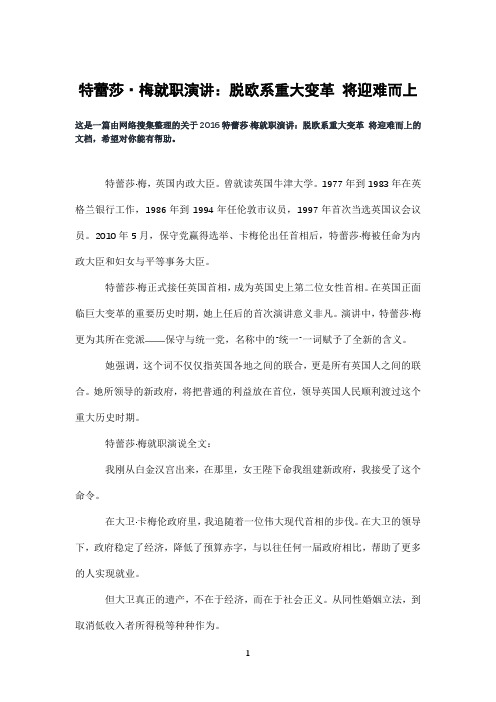
特蕾莎·梅就职演讲:脱欧系重大变革将迎难而上这是一篇由网络搜集整理的关于2016特蕾莎·梅就职演讲:脱欧系重大变革将迎难而上的文档,希望对你能有帮助。
特蕾莎·梅,英国内政大臣。
曾就读英国牛津大学。
1977年到1983年在英格兰银行工作,1986年到1994年任伦敦市议员,1997年首次当选英国议会议员。
2010年5月,保守党赢得选举、卡梅伦出任首相后,特蕾莎·梅被任命为内政大臣和妇女与平等事务大臣。
特蕾莎·梅正式接任英国首相,成为英国史上第二位女性首相。
在英国正面临巨大变革的重要历史时期,她上任后的首次演讲意义非凡。
演讲中,特蕾莎·梅更为其所在党派——保守与统一党,名称中的“统一”一词赋予了全新的含义。
她强调,这个词不仅仅指英国各地之间的联合,更是所有英国人之间的联合。
她所领导的新政府,将把普通的利益放在首位,领导英国人民顺利渡过这个重大历史时期。
特蕾莎·梅就职演说全文:我刚从白金汉宫出来,在那里,女王陛下命我组建新政府,我接受了这个命令。
在大卫·卡梅伦政府里,我追随着一位伟大现代首相的步伐。
在大卫的领导下,政府稳定了经济,降低了预算赤字,与以往任何一届政府相比,帮助了更多的人实现就业。
但大卫真正的遗产,不在于经济,而在于社会正义。
从同性婚姻立法,到取消低收入者所得税等种种作为。
大卫·卡梅伦领导了一个统一的英国政府,我也将本着这一精神,继续领导下届政府。
虽然不是众人皆知,但我的党派的名称是保守与统一党。
“统一”一词对我而言尤其重要。
这个词意味着,我们相信联合——英格兰,苏格兰,威尔士和北爱尔兰之间珍贵无比的联合。
但这个词还有其他同等重要的含义。
除了英国各地之间的联合,它还意味着,我们相信所有国民之间的联合,无论出身与身份,我们每个人之间的联合。
这种联合是指反抗因不公而遭遇的磨难。
因出身贫寒,而比他人少活九年。
乱刀弑母杀妹
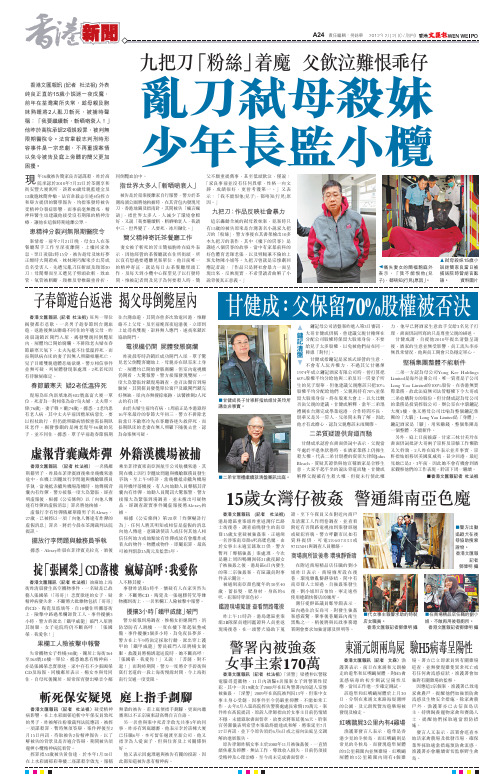
鏞記母公司清盤案昨進入第3日審訊,大哥甘健成供稱,曾建議父親甘穗煇在分配公司股權時保留大股東身份,不要給兒子太多股權,以免被他們站在同一陣線「對付」。
甘健成指鏞記是家族式經營的生意,不會有人玩弄權力,不過其父甘穗煇1974年成立鏞記酒家有限公司時,曾打算把60%股權平均分給他與二弟及另一房妻子所生的兒子琨華,但他建議父親應該只把30%股權平均分配給他們,父親則持有70%並保留大股東身份。
終在股東大會上,以大比數否決父親的建議。
甘健成解釋,當年二弟琨禮剛在台灣完成學業返港,合作時間不長,琨華又是另一房人,兄弟間未夠了解,因此他才有此擔心,認為父親應該未雨綢繆。
二弟質疑證供背道而馳甘健成承認曾在書面供詞中表示,父親當年處於半退休狀態時,在酒家業務上仍操生殺大權。
代表二弟甘琨禮的資深大律師John Bleach,質疑其證供與他宣稱酒家是合夥生意,大家平起平坐的說法背道而馳。
甘健成解釋父親確有生殺大權,但從未行使此權力,他早已將酒家生意放手交給3名兒子打理,書面供詞所寫的只是尊重父親的描述。
甘健成謂,自從他2010年提出清盤呈請後,酒家的生意並無受影響,員工流失率亦無異常情況,他與員工開會只為穩定軍心。
堅稱集團整體不能斬件二弟一方認為母公司Yung Kee Holdings Limited是海外註冊公司,唯一資產是子公司Long Yau Limited的100%股份,在香港無實際業務,故此法庭無司法管轄權下令大哥或二弟收購對方的股份。
但甘健成認為母公司的業務是投資控股公司,辦公室在中環鏞記大廈5樓,他又將母公司比喻為整個鏞記集團的「大腦」,Long Yau Limited是「身體」,鏞記酒家是「腳」,用來賺錢,整個集團是一個整體,不能斬件。
另外,庭上日前披露,甘家三妹甘美玲在書面供詞批評大哥兩子崇軒及崇轅工作懶散又欠幹勁,2人昨在庭外表示並非事實,崇軒指姑姐移居美國夏威夷,甚少回港,最近見她已是2、3年前,因此她不會有機會到酒家觀察他們的工作表現。
【双语】英国新首相“新铁娘子”特雷莎183;梅就职演讲全文
【双语】英国新首相“新铁娘子”特雷莎·梅就职演讲全文当地时间13日,特蕾莎·梅在唐宁街10号发表就职演讲,正式接任英国首相,成为英国史上第二位女首相。
在演讲中她称,脱欧使英国面临着重大改变,但她相信英国将“迎难而上”,她的使命是“建设一个更美好的英国”。
Statement from the New Prime Minister Theresa MayI have just been to Buckingham Palace where Her Majesty the Queen has asked me to form a new government, and I accepted.我刚去过白金汉宫,女王陛下要我组建新政府,我接受了。
In David Cameron, I follow in the footsteps of a great, modern prime minister. Under David's leadership, the government stabilized the economy, reduced the budget deficit, and helped more people into work than ever before.我沿戴维·卡梅伦的足迹前行,他是一位伟大、现代的首相。
在卡梅伦的领导下,政府稳定了经济,降低了财政赤字,帮助比以往更多的人找到工作。
But David's true legacy is not about the economy, but about social justice. From the introduction of same-sex marriage, to taking people on low wages out of income tax altogether.但戴维真正的遗产并非搞经济,而是社会公正。
英国首相梅姨演讲感言全文
英国首相梅姨演讲感言全文这是一篇由网络搜集整理的关于英国首相梅姨演讲感言全文的文档,希望对你能有帮助。
Mr President, Deputy Secretary-General, Excellencies, Ladies and Gentlemen, it is a great honour for me to address this General Assembly for the first time and to do so as Prime Minister of a country that has always been a proud and pro-active member at the very heart of this United Nations.This United Nations was formed because leaders across the world knew that they could only deliver security for their citizens at home if they could cooperate, as a community of nations, to deliver security across the globe.Some of the threats that we face together today are familiar to those founding leaders: war, political instability, abuses of human rights and poverty.Others are new: global terrorism, climate change, and unprecedented mass movements of people.We gather here today because we know that such challenges do not respect the borders of our individual nations and that only by working together shall we overcome them.As a new Prime Minister to the United Kingdom my pledge to this United Nations is simple: the UK will be a confident, strong and dependable partner internationally – true to the universal values that we share together.We will continue to honour our commitment to spend 0.7 per cent of ourGross National Income on development, building on the achievements we have already made to reduce poverty, deal with instability and increase prosperity the world over. And we will drive forward the implementation of the Sustainable Development Goals.We will continue to champion the rights of women and girls, making sure that all girls get the education they deserve, and tackling horrific abuses such as female genital mutilation and the use of sexual violence in conflict.We will continue to be a steadfast, permanent member of the Security Council, meeting our NATO commitment to spend 2 per cent of GDP on defence and making a leading contribution to UN peacekeeping efforts, where we have doubled our commitment, including new deployments to Somalia and South Sudan.We will continue to stand up for the rules based international system and for international law, and I join other leaders in condemning the outrageous bombing of the aid convoy in Syria yesterday.We will continue to play our part in the international effort against climate change. And in a demonstration of our commitment to the agreement reached in Paris, the UK will start its domestic procedures to enable ratification of the Paris agreement, and complete these before the end of the year.And we will continue to strengthen our existing partnerships, from this United Nations, to the Commonwealth and NATO, seeking to resolve conflict in countries across the world - from Colombia and Cyprus to Somalia and Yemen.But we must never forget that we stand here, at this United Nations, as servants of the men and women that we represent back at home.And as we do so, we must recognise that for too many of these men and women the increasing pace of globalisation has left them feeling left behind.The challenge for those of us in this room is to ensure that our governments and our global institutions, such as this United Nations, remain responsive to the people that we serve. That we are capable of adapting our institutions to the demands of the 21st century and ensuring that they do not become irrelevant.So when it comes to the big security and human rights challenges of our time, we need this – our United Nations - to forge a bold new multilateralism.Because as we have seen even in the past week, no country is untouched by the threat of global terrorism. And when extremists anywhere in the world can transmit their poisonous ideologies directly into the bedrooms of people vulnerable to radicalisation, we need not just to work together to prevent conflict and instability in nation states but to act globally to disrupt the networks terrorist groups use to finance their operations and recruit to their ranks.When we see the mass displacement of people, at a scale unprecedented in recent history, we must ensure we are implementing the policies that are fit for the challenges we face today.And when criminal gangs do not respect our national borders – trafficking our fellow citizens into lives of slavery and servitude – we cannot let those bordersact as a barrier to bringing such criminals to justice.In each of these areas, it is the convening power of our United Nations that gives us a unique opportunity to respond. But we can only do so if we modernise and adapt to meet the challenges of the 21stcentury.As a United Nations we have shown how we can work together to reduce the threat from international terrorism by preventing conflict and instability from developing.For example, through our Permanent Membership of the Security Council, Britain has played a leading role in the fight against Al Shabaab in Somalia. Since 2010, with huge support from across the region, and critically the commitment of Somalis themselves, Al Shabaab has been driven from all the major cities it used to control.It is vital that as an international community we continue to support countries in the region that are contributing thousands of troops, and that we continue to build the capacity of Somali security forces. That is why the UK is now going to increase further our security support and we will be calling on others to do the same, hosting an international conference on Somalia in 2017 to maintain this vital momentum.Missions like this must remain central to the work of this United Nations, but on their own they are not enough.Because the terrorist threats we face today do not come from one country but exist in a different space. The global networks they exploit require a differentkind of global response.These organisations are using our own modern banking networks against us. So we need to look at our regulations, our information sharing and using our technological capabilities to get ahead of them.They are targeting our airlines, exploiting the fact that no one country can keep its citizens safe when they are flying between multiple jurisdictions.That is why this week the United Nations will vote on a UK led resolution on aviation security to ensure that every country implements the standards we need to ensure that no country is the weak link.They are exploiting the internet and social media to spread an ideology that is recruiting people to their cause all over the world. So we need to tackle this ideology head-on.That is why the UK has championed the work that the Secretary General has led to develop a strategy for Preventing Violent Extremism. Now, as an international community, we must work together to adopt and implement the most comprehensive national action plans to tackle both the causes and the symptoms of all extremism.It is not enough merely to focus on violent extremism. We need to address the whole spectrum of extremism - violent extremism and non-violent extremism; Islamist and neo-Nazi – hate and fear in all their forms.Just as we need the United Nations to modernise to meet the challenges of terrorism in the 21st century, so we also need to adapt if we are to fashion atruly global response to the mass movements of people across the world and the implications this brings for security and human rights.The 1951 convention and the 1967 protocol must remain the bedrock of our response, but the context in which they must be applied has dramatically changed.Across the world today, there are 65 million people who have been forcibly displaced. That it is equivalent to the entire population of the United Kingdom.It is an unprecedented figure, one that has almost doubled in a decade. And yet UN appeals are underfunded; host countries are not getting enough support; and refugees are not getting the aid, education and economic opportunities they need.We must do more. And as the second largest bi-lateral provider of assistance, the UK remains fully committed to playing a leading role.In the last 5 years the UK has invested over $9 billion in humanitarian assistance, saving millions of lives every year.The London Syria Conference in February raised $12 billion in pledges, the largest amount ever raised in one day in response to a humanitarian crisis.And that money is being used to combine both urgent humanitarian assistance and vital economic development, benefitting both refugees and the communities and countries hosting them.Clearly we need to continue our efforts to bring an end to the conflict and the appalling slaughter in Syria and to get aid through to those who need it.And while these efforts continue inside Syria, we also agreed new efforts to support refugees and host communities in neighbouring countries, including through education and opportunities to work. This is being assisted by loans from international financial institutions and access to European markets. And through our trading relationships and direct engagement with businesses we are mobilising the private sector to create new jobs in the region for everyone.And while there is more to be done, it is this approach to financing both humanitarian support and economic development that I will be championing when I announce a further UK financial contribution at President Obama’s Refugee Summit later today.But in addition to refugees and displaced people fleeing conflict and persecution, we are also seeing an unprecedented movement of people in search of greater economic opportunities through the same unmanaged channels.This affects all of us, and it is the responsibility of us all to take action. We cannot ignore this challenge, or allow it to continue unmanaged. We need to do better. Better for the countries people leave, for the countries they move through, for the countries they try to get to – and most of all, better for the migrants and refugees themselves.Despite the huge increase in international efforts, more migrants have died attempting hazardous journeys across borders this year than any other. I believe we have to use the opportunity afforded by this General Assembly for an honest global debate to address this global challenge.In doing so, we should be clear that there is nothing wrong with the desire to migrate for a better life. And also that controlled, legal, safe, economic migration brings benefits to our economies.But countries have to be able to exercise control over their borders. The failure to do so erodes public confidence, fuels international crime, damages economies and reduces the resources for those who genuinely need protection and whose rights under the Refugee Convention should always be fulfilled.I believe there are three fundamental principles that we now need to establish at the heart of a new approach to managing migration that is in the interests of all those involved.First, we must help ensure that refugees claim asylum in the first safe country they reach. The current trend of onward movements, where refugees reach a safe country but then press on with their journey, can only benefit criminal gangs and expose refugees to grave danger.So we must all do more to support countries where the refugees first arrive - to provide the necessary protection and assistance for refugees safely and swiftly, and to help countries adapt to the huge economic impact that refugees can have – including on their existing population.As we are seeing in Jordan, Lebanon and Turkey, when the right assistance is provided, solutions that provide sanctuary and opportunity to refugees, and opportunities for those hosting them, can be found.This is also good for the refugees and the countries they come from –because the closer they stay to home, the easier it will be for them to return and rebuild after the conflict.Second, we need to improve the ways we distinguish between refugees fleeing persecution and economic migrants. I believe we must ensure the existing convention and protocol are properly applied to provide protection to refugees and reduce the incentives for economic migrants to use illegal routes. This in turn will help us target support for those refugees who need it most and retain the support of our populations for doing so.Third, we need a better overall approach to managing economic migration which recognises that all countries have the right to control their borders - and that we must all commit to accepting the return of our own nationals when they have no right to remain elsewhere.By ensuring a managed and controlled international migration response - and at the same time investing to tackle the underlying drivers of displacement and migration at source - we can reject isolationism and xenophobia, achieving better outcomes for all of our citizens – and particularly for the most vulnerable.Finally, as we gather here today to bring the founding values of the United Nations to bear on some of the most pressing global problems, the likes of which we haven’t seen before, so we must also face up to the fact that some of the worst human rights abuses that we thought we had confined to the history books have re-emerged in new pernicious forms.The Universal Declaration of Human Rights proclaimed by the GeneralAssembly stated that all human beings are born free and equal in dignity and rights, that no one shall be held in slavery or servitude and that slavery and the slave trade shall be prohibited in all their forms.Yet nearly seventy years on, we are presented with a new form of slavery: modern slavery.Organised crime groups, who are largely behind this modern slavery, lure, dupe and force innocent men, women and children into extreme forms of exploitation.Trafficked and sold across borders; victims are forced into living the kind of inhumane existence that is almost too much for our imagination.These criminals have global networks to help them make money out of some of the wor ld’s most vulnerable people. Victims are held captive in squalid conditions under the constant shadow of violence and forced into sex and labour exploitation.If we are going to succeed in stamping out this abhorrent crime and bring the perpetrators to justice, we need to confront the reality of what we are dealing with.These organised crime groups work across borders and jurisdictions. And they often use the internet and modern technology to recruit, transport, control and exploit their victims, all the while staying ahead of legal systems that are often constrained by traditional geographical boundaries.So we must take action.We must use our international law enforcement networks to track these criminals down, wherever they are in the world, and put them behind bars where they belong.We need to be smarter and even more co-ordinated than the criminal gangs in our efforts to stop them.In the UK, I am setting up the first ever government taskforce for modern slavery, bringing together every relevant department to co-ordinate and drive all our efforts in the battle against this cruel exploitation.We are also using our aid budget to create a dedicated fund focused on high risk countries where we know victims are regularly trafficked to the UK.And yesterday, I committed the first £5 million from this fund to work in Nigeria to reduce the vulnerability of potential victims and step up the fight against those who seek to profit from this crime.But if we are to meet the Sustainable Development Goal to eradicate modern slavery, we need to go much further.Security relationships have developed between so many countries for dealing with issues like counter-terrorism, cyber security, drug trafficking and wider intelligence sharing. But we do not have a similar relationship for this fight against modern slavery.So we need our law enforcement agencies to work together – with joint investigation teams working across multiple countries.Victims will only find freedom if we cultivate a radically new, global and co-ordinated approach to defeat this vile crime.Together we must work tirelessly to preserve the freedoms and values that have defined our United Nations from its inception.Together we must work tirelessly to restore these freedoms and values to the lives of the men, women and children who are exploited for profit and held captive with little or no chance of escape.From the St James’ Palace declaration and the Atlantic Charter forged by Winston Churchill and President Roosevelt, to the first meeting of this General Assembly in London in 1946, the United Kingdom has always been an outward-facing, global partner at the heart of international efforts to secure peace and prosperity for all our people.And that is how we will remain. For when the British people voted to leave the EU, they did not vote to turn inwards or walk away from any of our partners in the world.Faced with challenges like migration, a desire for greater control of their country, and a mounting sense that globalisation is leaving working people behind, they demanded a politics that is more in touch with their concerns; and bold action to address them.But that action must be more global, not less. Because the biggest threats to our prosperity and security do not recognise or respect international borders. And if we only focus on what we do at home, the job is barely half done.So this is not the time to turn away from our United Nations. It is the timeto turn towards it.Only we – as Members of this community of nations – can act to ensure this great institution becomes as relevant for our future as it has been in our past.So let us come together, true to our founding values but responsive to the challenges of today and let us work together to build a safer, more prosperous and more humane world for generations to come.。
梅德韦杰夫:“黄金配角”的崛起和衰落
梅德韦杰夫:“黄金配角”的崛起和衰落作者:暂无来源:《领导文萃》 2020年第20期郑立颖2020年一开年,俄罗斯政治大动作不断。
总统普京向俄议会两院发表国情咨文,提出了“彻底改革计划”的几个小时后,梅德韦杰夫内阁全体辞职。
总理级别职位的“换血”,对于一个国家的政局发展将产生重大影响。
30年政坛搭档,到今天真的要分道扬镳吗?普京的回答显然不是。
新职位权重几何离开总理之位,梅德韦杰夫的新角色是俄罗斯联邦安全委员会副主席——该职位是普京为其量身打造特别设立。
日前,普京发布联邦总统令,明确了梅德韦杰夫在新职位上的权力。
俄罗斯联邦国家安全委员会,简称国安会,是掌管国家军事安全力量的,凌驾各部门之上的超级机构,其职责垂直专属于总统支配,确保俄罗斯军权的直接管理。
尤其是俄情报机构克格勃也在其中。
俄媒指出,如果说在20世纪90年代,安全委员会仅是俄罗斯立法和行政的咨询性机构,那么如今,它可以被称作“普京政治局”,甚至是普京的“影子政府”。
卡内基莫斯科中心专家斯塔诺瓦亚2016年写道:“在普京回归及安全部队日益扩大的当下,安全委员会已经成为‘俄罗斯最重要的决策中心之一’,随着乌克兰危机的爆发以及制裁的实施,它承担越来越大的管理职能。
”分析认为,普京将这么重要的职位交给梅德韦杰夫,其官职权力不输于之前的任何职务,可见普京对自己老朋友的信任。
不过,人们很快发现,梅德韦杰夫公开的权力范围与安全委员会秘书帕特鲁舍夫高度重合,没有上下级隶属关系。
此外,该职位直接听命于总统,并由总统负责任命和罢免。
追随普京三十年,梅德韦杰夫早已成为公认的“黄金配角”,而今,“梅普二人转”在政治舞台上落幕。
但作为安全委员会副主席,梅德韦杰夫并没有离开普京的核心权力圈,作为昔日的同乡、同窗、同事,梅普二人能否继续以最佳拍档的角色在俄罗斯政治舞台上呈现,外界多了些疑虑。
梅德韦杰夫新职位走马上任后,普京在接受采访时驳斥了梅普关系破裂一说,“什么都没有破裂,梅德韦杰夫只是改变了他的业务范围。
亚洲政坛因腐败下台的领导人
亚洲政坛因腐败下台的领导人9月19日晚,泰国军方突然发动军事政变,宣布解散看守政府总理领导的内阁,由一个名为国家管理改革委员会的军事组织全权接管国家政权。
当时正在纽约参加联合国大会的他信被迫宣布辞职,只好飞赴英国伦敦度假。
10月1日下午,泰国国王普密蓬签署御令,任命现年63岁的枢密院大臣素拉育为泰国临时总理。
据媒体报道,引发他信下台的直接原因,是发生在今年1月底的股票交易违规事件。
他信家族将其拥有的西那瓦集团的近50%的股份出售给新加坡国有的经济巨鳄淡马锡公司,成交金额为19亿美元。
泰国证券公司后来裁定,他信之子在股票交易中违规,反对派指责他信利用政治权力为家族牟利。
这一起泰国历史上最大的外资并购案,最终使执政5年之久的他信在各种社会冲突的总爆发中灰暗下台。
在亚洲各国(地区)的历史上,因为腐败而下台的高级政客不在少数,他们中也有不少人尽管竭力挣扎,但最终仍免不了下台的命运。
埃斯特拉达:为了美人丢江山菲律宾前总统埃斯特拉达曾经是一个电影演员。
1969年,他弃影从政,当选马尼拉圣胡安市市长,并连任达17年之久。
此后,他依靠自己在当演员时积攒下的人气,官运亨通,终于在1998年当选菲律宾总统。
埃斯特拉达是一位典型的好色之徒。
除了太太路易莎・埃杰西多外,他还有5个情妇、11个私生子,这还只是媒体曝光的部分。
埃斯特拉达上台后,菲律宾经济和社会治安状况持续恶化,而他却热衷于通宵达旦地参加酒会和赌会。
在这种场合,他都会带上自己的情妇或者新女友出席。
每次狂欢结束,他还要拿出100万比索(15万人民币)打赏身边的女人。
和100万比索的“小费”比起来,埃斯特拉达更喜欢在菲律宾首都马尼拉为情妇建造豪宅。
其中一座豪宅占地7145平方米,里面有豪华游泳池,池边有人造细白沙滩,并配上制造波浪和烟雾的机器,其景色类似菲律宾旅游胜地博拉凯。
埃斯特拉达如此好色,以至于在短短2年的任期内,就花掉了菲律宾国库里整整4000万美元。
他的荒唐行为,连菲律宾政府内部也有很多人看不下去。
- 1、下载文档前请自行甄别文档内容的完整性,平台不提供额外的编辑、内容补充、找答案等附加服务。
- 2、"仅部分预览"的文档,不可在线预览部分如存在完整性等问题,可反馈申请退款(可完整预览的文档不适用该条件!)。
- 3、如文档侵犯您的权益,请联系客服反馈,我们会尽快为您处理(人工客服工作时间:9:00-18:30)。
龙源期刊网 http://www.qikan.com.cn
新首相梅姨要收拾多少烂摊子?
作者:陈季冰
来源:《领导文萃》2016年第22期
内政大臣特蕾莎·梅是继一代政治巨人撒切尔夫人后英国历史上第二位女性首相。现在,
新首相特蕾莎·梅必须小心翼翼地收拾前任留给自己的烂摊子。
尽管梅赢得了一半以上党内同僚的支持,承诺将以“强有力的领导”弥合退欧公投引发的政
治分歧和市场动荡,并带领英国成功完成脱离欧盟的法律程序,但她所面对的注定是一项“不
可能完成的使命”。
脱欧公投解决的只是一个意愿问题,并不能解决任何实际问题。因此,未来几年英国将陷
入如何脱欧的持久争论之中。根据英国宪法,此次公投并不具有法律上的约束力,所以英国议
会必须通过法案,让脱欧变成现实。然而,在目前的英国国会中,如果连同工党和其他在野党
在内,有2/3的议员是反对脱欧的,这实际上就使梅今后每一次前往布鲁塞尔之前都会遭遇一
大堆理智与情感上的诘难。
撇开欧洲法院管辖权和共同防务等政治军事关系,仅就经济层面来看,比较现实的一种方
案是,英国同欧洲共同市场的新关系可以采取挪威模式。挪威模式的实质可用一句话来概括—
—事实上置身于欧盟内部、不得不被动接受欧盟的指令但又没有投票权。例如,挪威对欧盟财
政预算的贡献平摊到每个国民身上并不低于英国,它还要接受无限制的欧盟移民以及受到欧盟
法规的约束……这显然是英国人不能接受的,他们要逃离不正是为摆脱约束吗?
第二个选项是切断所有与欧盟相关的纠缠,只依靠WTO规定,然后再争取磋商一项新协
议。
挪威模式也许会得到支持留欧的英国本届国会的赞同,但必然招致脱欧派的强烈反弹,
WTO模式(以WTO费率与欧盟市场开展贸易)预计很难在这一届议会中获得通过。这个僵
局只能通过提前大选来解决,但只要大选的结果不是产生一个一边倒支持脱欧或一边倒支持留
欧的新国会下议院,政治上的瘫痪状态就仍将延续下去。
龙源期刊网 http://www.qikan.com.cn
除此之外,梅还必须处理好联合王国内部因脱欧公投而激起的强大离心力。众所周知,苏
格兰、北爱尔兰和大伦敦地区的大多数选民强烈反对脱欧。苏格兰民族党领袖已经呼吁就苏格
兰独立问题再次举行公投,一旦退出英国,将以独立国家的身份重新加入欧盟。尖锐的政治分
歧不仅体现在伦敦、苏格兰和北爱尔兰三个地方,大城市与农村、英格兰各郡与凯尔特地区之
间都存在分歧。这些都不可避免地对英国未来的完整性构成潜在的压力。
除了横向的地域分歧,纵向的代际分歧可能会给英国未来政治纷争提供持续的温床。无论
是公投前的民调还是公投计票结果均显示,总体上看,支持留欧阵营的年轻人居多,他们更关
注未来;支持脱欧的老年人居多,大不列颠昔日的孤立传统对他们更有感召力。在24岁以下
的年轻人中,投票留欧高达3/4。许多年轻选民愤愤地说,决定是老一辈做出的,承担长期后
果却是年轻人。这为英国政治的未来埋下了不稳定引线。
梅曾表示,今年内不会主动触发《里斯本条约》第50条,即欧盟退出条款。但这很可能
由不得她。只要不启动第50条,英国就依然是欧盟成员国,公投结果实际上就被冻结。但这
种冻结不可能维持太长时间,因为民粹主义政客永远都不会消失,当他们想要伺机为自己牟求
政治利益时,脱欧是最好的炒作话题。
从欧盟来看,情况也不乐观。德国总理默克尔等欧洲领导人以再明确不过的口吻向英国喊
话:单一市场与无条件接受移民是捆绑在一起的,不可能任由英国在其中二选一。不管怎样,
特蕾莎·梅的当选确保了英国政治在最短的时间内结束不确定性,暂时恢复稳定。然而,这种
稳定局面很可能是短暂和脆弱的。因为她所接手的——无论是与布鲁塞尔展开的脱欧谈判,还
是联合王国内部的重新凝聚——都将是不可能完成的使命。
(摘自《金融时报》)
